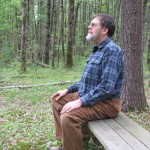We have set aside most of our usual business agenda, and are holding instead something we are calling “Meeting to Hear God’s Call.”
We are hearing a lot of messages about world suffering, economic injustice, environmental destruction. We hear a lot of despair.
Some of the messages feel rooted in Spirit to me; if others are, it is not in a way that I can discern. I wrestle with my own anxiety over doing “enough.” I know that I live in a manner that is far more comfortable than 90% of the planet’s humans ever will; I know that my lifestyle is unsustainable. I know that I have not sold all I have and given it to the poor (though I’m also grateful that, as a non-Christian among Friends, that one is not a given for me, but one whose social justice message must prove itself to me on its own terms, not just because Rabbi Yoshua said it back in the wayback.) (Mind you, it’s message is pretty damned compelling.)
I am in the weeds; I am in the tall grass. So, I suspect, is my meeting. And we are wrestling not just with the need to walk our talk, but with despair.
Will T. rises. Gives a message about Abraham. About God talking to this childless nonagenarian with an almost equally ancient wife. Taking him out under the stars and telling him to look up: if you could count all the stars in the sky, that’s how many your descendants will be one day. God promises this.
The message is about Moses. About wandering in the desert with the children of Israel, and about the Promise: there’s a land. I’m leading you there. Just follow me, and you will be in the Kingdom of God. About God keeping promises, and about the present reality of the Kingdom of God.
I remember my sense, last fall, sitting with Janet and her friends, as her wife Abby lay dying, and amid the grief and the sadness, feeling the love and the commitment we all had to one another and to both of them: my sense that I was, that moment, witnessing the Kingdom of God.
There is never reason to despair. That promise is kept every day. Filled with betrayals and pain though the world is, sick unto death though it may be, we are in the Kingdom as soon as we are faithful to where we are being led.
The promise? The Kingdom of God? That is the place, surely, where we stop ignoring or objectifying the poor, we stop killing the earth, we stop distracting ourselves from loving and forgiving each other with our favorite addictions.
I have a sudden, almost overwhelming sense of what it would be like, to live into that Kingdom, and I’m almost overcome with joy–and with impatience at all the things we allow to interfere with our faithfulness as individuals or as a body. Every moment I spend not heeding the call of Spirit is a moment I delay the Kingdom; every moment we listen, as a body, to our own wills, however altruistically we think we are motivated, is a moment we are not entering that Kingdom.
I want to weep. But I no longer want to despair. And my worship deepens.
Note to self: Re: ministry. Is it possible that despair is one of the signs that a message is not of God?
Later on, I have the chance to tell Will how much his ministry meant to me. I tell him both of my joy in the sense of the immanence of that “place” where we live faithfully in the world into the promise of justice and mercy Spirit gives us, and my deep, deep sadness that we are so good at delaying our entry there.
He reminds me that the Kingdom is present, and that there is a way we cannot delay it. I share with him the story of being with Janet the night of Abby’s death. He nods. While my vision of the Kingdom is not necessarily his, it is not too alien to be recognizable.
N, a close friend from my home meeting, is surprised that Will’s message spoke to me, both because of its Biblical imagery and on its own terms. Far more Christian than I am, she found the talk of kingdoms off-putting. “My God is not a King,” she says. I understand her point.
But I do keep having the sense that the Holy Spirit is a helluva translator.
Later, the same meeting as Will’s message. I feel a leading to speak; test it, sit with it. It recurs. I stand.
We are using “mike spacers”–both to deal with accoustics in this large, unfriendly space, and to assist the hearing impaired, when we rise with a message, we are asked to wait for one of two microphone bearers to bring us a microphone to speak into. I wait patiently.
My message feels like a bookend to Will’s. It is not one that is natural to me, but, for the first time I am to give vocal ministry within the yearly meeting, that is good.
“Blessed are those who hunger and thirst for righteousness, for they will be filled.”
Spirit’s promises are kept.
I stand. I wait for the mike runner. I am handed the mike, recognized, and I breathe in to speak.
But I am standing in the clerk’s blind spot, and she does not notice me, or that her mike runner has brought me the microphone. Just I open my eyes to speak, I see that she is starting the handshake that signals rise of meeting.
For a moment, my inward gears clash and grind, caught between the imperatives of delivering a message and the social forms of politeness, and recognizing the form of the end of meeting.
I speak, but I hesitate. I stammer; my voice is not clear. While I did not get in the way of the message fully, neither did I get out of its way with perfect faithfulness.
I suppose that does not matter. I hear Moses had a speech impediment, and vocal ministry is not a performance art. But that moment of hesitation, between human forms and simple obedience, has made me clumsy. I don’t know how many people heard the message.
I did speak. The handshakes paused as I spoke, then resumed, and we parted for lunch.
Later, I take a long walk with my friend K., and I need to talk about that stumbling message. At first, she misunderstands me, thinks I am concerned that the message was inappropriate or not faithful. She assures me that it felt Spirit-led to her.
One of the advantages of being non-Christian: when the Biblical stuff takes hold of me, it’s so against my grain, my personal preferences, that I can be at least reasonably sure it is not ego-driven! It’s an odd thing to be grateful for, maybe, but I’m grateful for that.
My point is much more superficial, much more shallow. I’d never spoken in yearly meeting before. And the interruption by the handshake–it hurt. It just hurt.
“Why don’t you just give me a nice paper cut, and pour lemon juice in it!?” I complained, in my best Miracle Max voice. And I spoke about how it felt like being smacked, being stung by a hornet, the way it happened.
At the same time, I’m well aware that my sting is not important, and that no one had intentionally done me any harm or disrespect. I was just raw, open and vulnerable, the way one is when trying to open to Spirit. And you know, shit happens.
Shit happened. I was sitting/standing in a blind spot for the clerk’s visual field. Perfection does not exist among us humans, and there you go.
I begin to appreciate the importance of making a serious study of the art of forgiveness. Because, short of hiding in your room for a lifetime, you’re going to need to forgive a lot of people. Sometimes including yourself.
What would be worse than rising with vocal ministry, being recognized, and being cut off by the handshake to end meeting? What is worse than getting a paper cut with lemon juice in it?
Being the clerk who made the error. Being the person who gave the paper cut and poured the lemon juice, however unwittingly.
We’re human. We’re going to play both roles again and again and again. We’re going to need that forgiveness stuff–a lot, I’m pretty sure.















